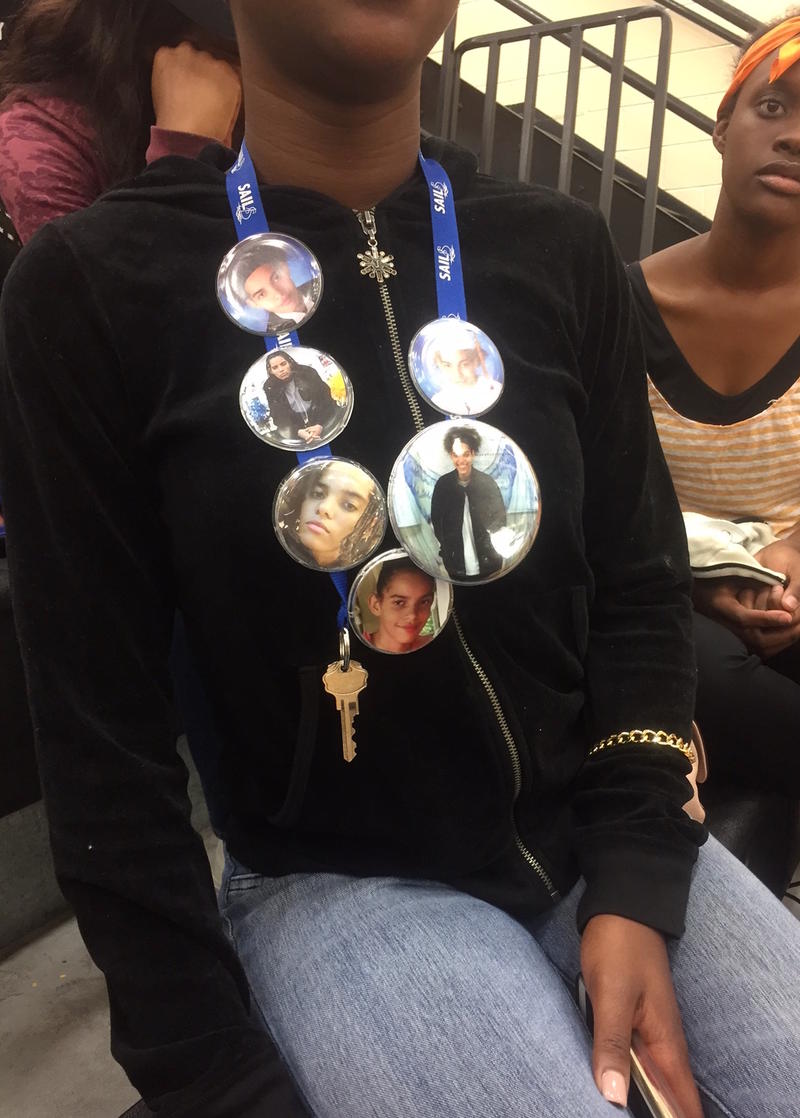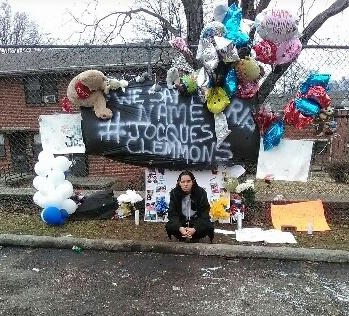
When 19-year-old Vastoria Lucas was shot multiple times next to a playground in an East Nashville public housing complex, her murder shocked the neighborhood.
She was a high school senior, a dedicated basketball player — an all-around good kid. And the brazenness of the killing, on a beautiful day with kids playing all around, stunned even the police.
At her funeral, Pastor Howard Jones asked God to heal Vastoria’s grieving friends and family. He didn’t want her murder to end in “another tragedy and another tragedy and another tragedy and another tragedy.”
Jones knew that violence tends to cascade through a neighborhood, one incident leading to another. The community where Vastoria was killed, the James Cayce Homes, is grappling with the
highest homicide rate in nearly three decades. With that surge comes a ripple of images and nightmares that haunt an entire community.

‘I Don’t Feel Safe’
At the funeral, people in the audience nodded and shouted in agreement as Jones asked that her murder stop there, that God lead the mourners to “a position of peace.” Hands reached for the heavens. Everyone wanted what Jones was talking about.
But a handful of them knew, that shortly before her murder, Vastoria hadn’t felt much peace. In fact, she’d been preoccupied with death. It felt too close. First her best friend and classmate DeJuan was shot and killed. Then her neighbor, Cash.
In January, she sent her sister, Christena Westbrooks, a message on Facebook. She wrote: “We never know; it might be one of us one day. Just in case I wanted to let you all that I love you and I am here for you.”
Ten days after Vastoria sent that note, a man named
Jocques Clemmons was shot and killed by a city police officer right outside her front door.
“It hit her hard,” Westbooks said, sitting outside her mother’s apartment in the Cayce Homes, where Vastoria was killed. “After that she was like, ‘I don’t feel safe in this neighborhood.’ She felt like something was going to happen to any one of us.”
Days after Clemmons’ death, Westbrooks took Vastoria to a support group at a nearby church where she sat in the back, barely saying a word. During the group meditation, Westbooks noticed that Vastoria couldn’t sit still. “The whole time her leg was just shaking,” Westbrooks said.
The group shared their feelings about the shooting. Soon it was Vastoria’s turn to talk. “I’m angry. Tired of hitting of hitting the floor. Tired of the gunshots,” she said.
Across the room, Kadia Edwards, a local pastor and activist, noticed Vastoria. “I remember automatically being drawn to her because she was so silent,” Edwards said.
As the meeting went on, Vastoria confessed to having nightmares of her friends’ bodies in coffins.
“I remember her vividly saying that she was having a difficult time sleeping at night,” Edwards said. “And she just said, ‘I feel like I’m next. Because I keep seeing people dying and I feel like I’m next.’ “

When Edwards saw Vastoria again it was at the funeral for Jocques Clemmons. They were in line to view his body, lying in a lime green casket. They walked up together. Edwards didn’t want to see Clemmons’ body, but Vastoria stood looking for what seemed like minutes.
“I sat back down in my seat,” Edwards said. “She got right back up and went up there again. And maybe stood, looked at the body again for what felt like another three minutes or so.”
The pull Vastoria had toward Clemmons’ casket struck Edwards. “I wonder what that’s about?” Edwards said to a friend sitting beside her.
New Nightmares
Less than a month later, on March 28, just after 5:30 p.m., Vastoria was walking home from a game of pickup basketball. A man named Kevin Smith approached her. He shot her multiple times in the chest and legs. A short time later, Smith was arrested and confessed to her killing.
A felon who’d been in and out of jail, Smith knew Vastoria and her family. Three years earlier, her mother says he’d assaulted Vastoria, and she’d fought back. It’s still unclear why he murdered her.
Edwards said when she found out about the killing, her “spirit was destroyed.”

On that day, Marilyn Greer was sitting in her apartment, talking on the phone. It was so beautiful outside she’d opened her windows. Then, she heard shooting.
“About 10 shots,” she said. “And it was just different this time.”
Greer jumped up and ran outside, worried the victim might be her granddaughter. For months, Greer had been having vivid dreams of her granddaughter being shot right in front of her. She had to get close to make sure it wasn’t her. But then she stayed, standing over Vastoria.
“Myself and some other ladies, we just joined hands and just started praying over the baby. As she was laying on the ground we just started praying over her,” Greer said.
For weeks, Greer couldn’t get the image of Vastoria out of her mind. Neither could the other women who prayed over the 19-year-old.
At a vigil for Vastoria the day after, Pastor Edwards encountered one of the women. She was hysterical, he said, convinced she couldn’t wash the blood off her hands and worried she hadn’t said the right thing to Vastoria in her final moments.
“She was saying, ‘I didn’t sleep last night, I keep seeing her face,’ ” Edwards recalled. She says she stayed with the women, hoping prayer might give them some comfort.
“There is something to be said about the nightmares that live inside of us after you see something so tragic,” Edwards said.
Nightmares that get passed along — person to person, shooting by shooting.


